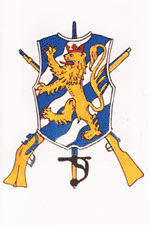

Text Mats Persson
How to read the markings on the Swedish m/94 Carbine and on the m/96 and m/38 Rifles.
The name of the manufacturer and the year of manufacture
are on the top of the receiver.
The serial number is on the left side of the receiver.
Most other parts have the last three figures of the serial number.
(Except for carbines with four-digit serial numbers,
on these the other parts only have the last two figures in
the serial number).
Parts on Husqvarna made rifles are not numbered to the same extent
as on rifles made by Mauser or Carl Gustaf.
A few weapons that are assembled by pupils at
the Armourer-course (VOK) have the name of that pupil
instead of a serial number.
After the course the Armourer kept the weapon as his
personal belonging.
A few weapons assembled by pupils at the Gunsmith-course
have a one, two or three digit serial number followed by a
slash and the last two digits in the year of assembly
(like; XXX/YY where XXX is the serial number and YY is the year,
other parts are marked XXX, or in some cases XXX/YY).
The initials of the Inspection-officer
are on the left side of the receiver
(before or after the serialnumber).
On some of the m/38 rifles manufactured by Husqvarna,
the initials of the Inspection-officer is stamped on top of
the rear sight base instead of on the receiver.
All parts received a Crown for approval, or a X for disapproval.
If the crown is horizontal the part is made by Mauser or Carl Gustaf,
if the Crown is tilted the part is made by a civilian company
(often Husqvarna).
The X should not be seen on an operational rifle,
but discarded parts were sometimes used for display purpose.
Parts made by Carl Gustaf could have a Crowned C instead of
an acceptance mark (because this part was already made by
The Crown, they did not need to accept it).
There are three additional inspection marks (Crowns) as well;
On the barrel
- the assembled action, barrel and sights has been inspected.
On the left side of the receiver
- the action has been proof fired.
On the stock, behind the trigger guard
- the rifle has been test fired and sighted in.
Spare barrels manufactured in 1955 or later have the last
digit of the diameter of the bore stamped close to the muzzle.
If some major repair has been done there is a stamp on the stock, behind the trigger guard and behind the Inspection-crown. If the work have been done by the State Arsenal in Eskilstuna Crowned C Carl Gustaf, Eskilstuna If the work have been done by an Army Workshop Crowned S Stockholms Tygstation, Stockholm Crowned K Karlsborgs Tygstation, Karlsborg Crowned CB Karlsborgs Tygstation, Karlsborg (Carlsborg, old spelling) Crowned B Bodens Tygstation, Boden Crowned Gg A2:s Tygstation, Göteborg Crowned Ch A3:s Tygstation, Kristianstad (Christianstad, old spelling) Crowned Ö A4:s Tygstation, Östersund Crowned G A7:s Tygstation, Gotland The same stamp is placed on the barrel if it is replaced. When a rifle had been sighted in with the pointed m/41 ammunition, it should be stamped with the hight of the front sight post on the left side of the front sight base, and a "T" on the right side of the front sight base. The first time a rifle went to an Armourer for a minor repair he may make a punch mark on the trigger guard. If he made some minor modification on the rifle he may make a second mark.
On the CG 63 Match rifle there is some additional markings, on the left side of receiver. A Crowned C, under that a horizontal bar and under the bar the year that the rifle was rebuilt. There is also a second proof mark, in the shape of a lightning. During WWII Finland purchased or borrowed a large numbers of gevär m/96 these got the Finnish acceptance stamp "SA" inside a rectangle, meaning "Suomen Armeija" (The Finnish Army). Some were kept by the Finnish Homeguard (or Civil Guard), these are marked "Sk.Y." which reads "SuojelusKuntien Yliesikunta" (or "Suojeluskuntain Yleisesikunta" I'm not sure). Mats INDEX